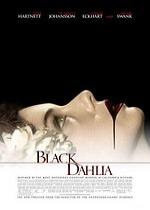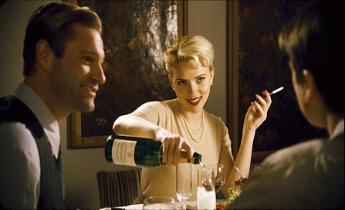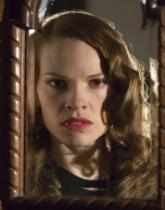
"Knight Thoughts" -- exclusive web content
DePallma's latest had the most promise and is the biggest disappointment of the year -- Freedomland notwithstanding
Not so Noir:
The Black Dahlia
9-15-06 "Knight Thoughts" web exclusive
By Richard Knight, Jr.
The Black Dahlia
9-15-06 "Knight Thoughts" web exclusive
By Richard Knight, Jr.
The director who brought us the most brutal bathtub murder in cinematic history was, on the face of it, an inspired choice to helm
The Black Dahlia, the fictionalized version of the real life 1947 vivisection of a young Hollywood wannabe. I refer to Brian
DePalma and Scarface, not Alfred Hitchcock and Psycho, of course. DePalma’s often demonstrated ability to turn on and then
unnerve movie audiences through the overt sexual pleasure of his screen women followed by their brutal killing or humiliation
absolutely seemed to make him the right director to bring to the screen James Ellroy’s noir stuffed novel in which the real life
Elizabeth Short killing plays the pivotal part. But the result of the union, though glossy and entertaining at times, is hamstrung by
the convoluted plot and further hampered by bad casting. The amazing L.A. Confidential, also based on an Ellroy noir-themed novel,
is right up there with Chinatown as one of the great Los Angeles based crime films and I had high hopes for The Black Dahlia which
promised similar dazzling results. But high expectations have resulted in something that is well, not so noir.
The plot revolves around two boxers/cops, Bucky Bleichert (the monotone voiced Josh Hartnett) who is dubbed “Mr. Ice” and hothead
Lee Blanchard (Aaron Eckhart) who is dubbed “Mr. Fire.” After a public boxing match for the police department done as a publicity
stunt to get a bond issue passed that guarantees raises for all, these two are given cart blanche and both go for the glamour and
prestige of becoming detectives. In the midst of this is blond coquette Kay Lake (Scarlett Johansson), Lee’s girlfriend who wields a
cigarette holder like a baton twirler and wears tight angora sweaters. Each night the boys come home to the swanky digs shared by
Kay and Lee while Bucky yearns for Kay who yearns right back. We are given a montage of the three sharing the good life (expertly
scored by Mark Isham as is the rest of the picture) though at one point the three, inexplicably, sit in a theatre in 1946 and watch
Conrad Veidt in a silent movie, The Man Who Laughed. In the clip Veidt plays a character who’s been disfigured and left with a
permanent smile. This strange little segment sticks out like a sore thumb and announces the arrival of the plot’s main course. This
is the discovery of the horribly defiled, sawed in half body of Elizabeth Short (Mia Kirschner) who’s mouth is also slashed from end to
end (the crane shot that announces the discovery of the body is the movie’s most affecting shot).
Not long after, Bucky, following a lead that the murder victim liked the ladies, heads to the lesbian bars to the tune of “Love for
Sale” sung by kd lang. As the dykes mill about in the swanky clubs we suddenly see lang, in tuxedo drag fronting a group of chorus
girls, belting out the number. Though enjoyable, the sight of the puffy faced lang is so at odds with the 40s conventions around her
that one is again thrown out of the picture. Then in walks Hilary Swank as Madeleine, the slutty bad girl socialite (a 40s version of
Paris Hilton) from the rich Linscott family, and Bucky falls hard for the vixen. A dinner scene with the eccentric Linscott’s at the family
mansion follows that’s almost as camp as the one in The Rocky Horror Picture Show (here and a bit later, Fiona Shaw as the mother
takes the Over the Top acting award of the year). But the crazy family at least gives you something more enticing than the dull
leads offer.
A lot more plot and various revelations that are telegraphed well in advance follow. Police corruption, naturally, plays a big part in
the shenanigans but there is none of the alternate repulsion/fascination; none of the juiciness that was so integral to L.A.
Confidential. Though Eckhart has his moments, eventually he goes full tilt, acting in overdrive. Playing the same type of character in
Confidential, Russell Crowe was lethal but compassionate. Against Eckhart we get the bulked up but still wet eyed Hartnett (he cries
three times this time out) in place of the cool as ice Guy Pearce and the bland, open mouthed (close your DAMN MOUTH!) Scarlett
Johansson in place of the creamy, sultry yet sad Kim Basinger. And while the entrance of the flinty Swank momentarily galvanizes
the picture she’s not exactly the sexual furnace she keeps claiming to be – especially when repeatedly tossing off lines like, “You
want to fuck me now don’t you?” Um, no.
Worse, for a director that has put some of the most visually beautiful and violent murders on the screen (the twirling knives in Carrie,
the gleaming razor in Dressed to Kill, the piano wire in Blow Out), DePalma skips over his chance at staging the infamous (and
unsolved) crime, Hollywood’s own Jack the Ripper style murder. When the killing is finally shown, near the conclusion of the picture,
it’s as a flashback, almost as an aside. Nor does DePalma further explore the potential offered by the tantalizing glimpses we see
of Short in screen tests dressed in black (hence her nickname) in which his own voice is heard as the irritable director barking
commands at the desperate to please starlet. Was the hesitation because Short was a real person?
After the anticipation of the opening scenes wears off, the rest of The Black Dahlia, shot mostly in drained sepia tones (instead of the
rich, blood red tones that the material cries out for) bumps and grinds along but never really congeals. There is none of the
passionate, operatic fire that DePalma has been noted for in the past and ironically, given the lurid material tossed in his lap – and
his own lurid cinematic resume – he has made perhaps the most restrained example of film noir in the genre’s history.
The Black Dahlia, the fictionalized version of the real life 1947 vivisection of a young Hollywood wannabe. I refer to Brian
DePalma and Scarface, not Alfred Hitchcock and Psycho, of course. DePalma’s often demonstrated ability to turn on and then
unnerve movie audiences through the overt sexual pleasure of his screen women followed by their brutal killing or humiliation
absolutely seemed to make him the right director to bring to the screen James Ellroy’s noir stuffed novel in which the real life
Elizabeth Short killing plays the pivotal part. But the result of the union, though glossy and entertaining at times, is hamstrung by
the convoluted plot and further hampered by bad casting. The amazing L.A. Confidential, also based on an Ellroy noir-themed novel,
is right up there with Chinatown as one of the great Los Angeles based crime films and I had high hopes for The Black Dahlia which
promised similar dazzling results. But high expectations have resulted in something that is well, not so noir.
The plot revolves around two boxers/cops, Bucky Bleichert (the monotone voiced Josh Hartnett) who is dubbed “Mr. Ice” and hothead
Lee Blanchard (Aaron Eckhart) who is dubbed “Mr. Fire.” After a public boxing match for the police department done as a publicity
stunt to get a bond issue passed that guarantees raises for all, these two are given cart blanche and both go for the glamour and
prestige of becoming detectives. In the midst of this is blond coquette Kay Lake (Scarlett Johansson), Lee’s girlfriend who wields a
cigarette holder like a baton twirler and wears tight angora sweaters. Each night the boys come home to the swanky digs shared by
Kay and Lee while Bucky yearns for Kay who yearns right back. We are given a montage of the three sharing the good life (expertly
scored by Mark Isham as is the rest of the picture) though at one point the three, inexplicably, sit in a theatre in 1946 and watch
Conrad Veidt in a silent movie, The Man Who Laughed. In the clip Veidt plays a character who’s been disfigured and left with a
permanent smile. This strange little segment sticks out like a sore thumb and announces the arrival of the plot’s main course. This
is the discovery of the horribly defiled, sawed in half body of Elizabeth Short (Mia Kirschner) who’s mouth is also slashed from end to
end (the crane shot that announces the discovery of the body is the movie’s most affecting shot).
Not long after, Bucky, following a lead that the murder victim liked the ladies, heads to the lesbian bars to the tune of “Love for
Sale” sung by kd lang. As the dykes mill about in the swanky clubs we suddenly see lang, in tuxedo drag fronting a group of chorus
girls, belting out the number. Though enjoyable, the sight of the puffy faced lang is so at odds with the 40s conventions around her
that one is again thrown out of the picture. Then in walks Hilary Swank as Madeleine, the slutty bad girl socialite (a 40s version of
Paris Hilton) from the rich Linscott family, and Bucky falls hard for the vixen. A dinner scene with the eccentric Linscott’s at the family
mansion follows that’s almost as camp as the one in The Rocky Horror Picture Show (here and a bit later, Fiona Shaw as the mother
takes the Over the Top acting award of the year). But the crazy family at least gives you something more enticing than the dull
leads offer.
A lot more plot and various revelations that are telegraphed well in advance follow. Police corruption, naturally, plays a big part in
the shenanigans but there is none of the alternate repulsion/fascination; none of the juiciness that was so integral to L.A.
Confidential. Though Eckhart has his moments, eventually he goes full tilt, acting in overdrive. Playing the same type of character in
Confidential, Russell Crowe was lethal but compassionate. Against Eckhart we get the bulked up but still wet eyed Hartnett (he cries
three times this time out) in place of the cool as ice Guy Pearce and the bland, open mouthed (close your DAMN MOUTH!) Scarlett
Johansson in place of the creamy, sultry yet sad Kim Basinger. And while the entrance of the flinty Swank momentarily galvanizes
the picture she’s not exactly the sexual furnace she keeps claiming to be – especially when repeatedly tossing off lines like, “You
want to fuck me now don’t you?” Um, no.
Worse, for a director that has put some of the most visually beautiful and violent murders on the screen (the twirling knives in Carrie,
the gleaming razor in Dressed to Kill, the piano wire in Blow Out), DePalma skips over his chance at staging the infamous (and
unsolved) crime, Hollywood’s own Jack the Ripper style murder. When the killing is finally shown, near the conclusion of the picture,
it’s as a flashback, almost as an aside. Nor does DePalma further explore the potential offered by the tantalizing glimpses we see
of Short in screen tests dressed in black (hence her nickname) in which his own voice is heard as the irritable director barking
commands at the desperate to please starlet. Was the hesitation because Short was a real person?
After the anticipation of the opening scenes wears off, the rest of The Black Dahlia, shot mostly in drained sepia tones (instead of the
rich, blood red tones that the material cries out for) bumps and grinds along but never really congeals. There is none of the
passionate, operatic fire that DePalma has been noted for in the past and ironically, given the lurid material tossed in his lap – and
his own lurid cinematic resume – he has made perhaps the most restrained example of film noir in the genre’s history.



